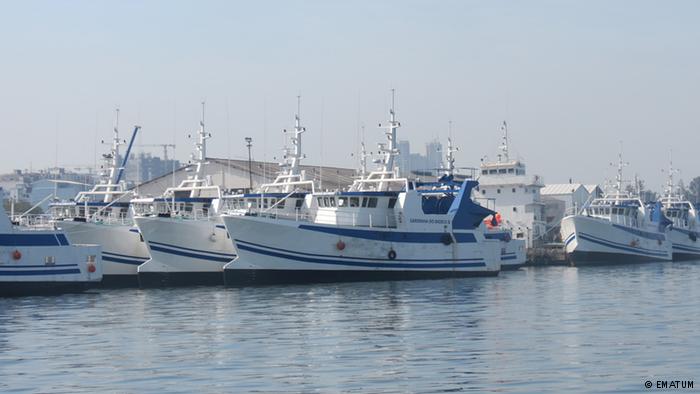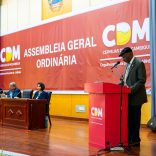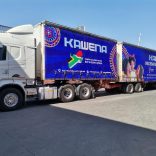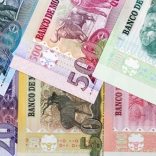Mozambique: Police force street vendors to move to local markets in Maputo
Ematum: Mozambique hid from investors a US$622 million loan – DW

DW / / The Wall Street Journal has revealed that the Mozambican government hid from Ematum investors a US$622 million loan. It was contracted in 2013, at the peak of natural gas discoveries in the country, and intended to finance the purchase of ships and radars to fight piracy.
The Mozambican government hid from Ematum investors a loan of US$622 million dollars, the Wall Street Journal revealed on Monday (April 4) . The money was obtained in 2013, at the peak of natural gas discoveries in the country and intended to finance the purchase of ships and radars to fight piracy. Mozambique’s Centre for Public Integrity insists on more transparency.
According to WSJ, investors were not informed of this other loan until after the approval of the Mozambican Tuna Company debt restructuring plan at the end of last month.
Mozambique has experienced debt repayment difficulties, largely due to the drop in price of its raw material exports, and the Ematum affair has led to the country being pointed up in newspapers and by financial agencies as a case study of the dangers of betting on emerging markets.
Ematum is owned by various public bodies, including the Mozambican secret services. The controversial business was also used to purchase military equipment, but after pressure from donor countries, it ended up included the amended state budget last year.
Ematum is owned by various public bodies, including the Mozambican secret services. The controversial business was also used to purchase military equipment, but after pressure from donor countries, it ended up included the amended state budget last year.
DW Africa discussed the issue with Borges Nhamire, investigator at Mozambique’s Centre for Public Integrity (CIP), which has long insisted on greater transparency and government accountability.
Borges Nhamire (BN): In my opinion, this information was not disclosed because behind this business are the individual interests of figures from the ruling political elite. The idea was to create companies that would do the security work to ensure coastal protection in Mozambique, and particularly to protect companies working in the Rovuma Basin natural gas exploration. It was a business window for individuals and not for the state.
Ematum i s a company where generals of the armed forces came together and it was they who saw the opportunity, through this company, for millionaire businesses doing coastal protection. But the business went wrong because commodity prices, including gas, have fallen a lot. It was a loan contracted believing in a business that had not yet become effective and that would take time to become effective. Strategically, they had no way to reveal this information. It was convenient to reveal that it was for the purchase of tuna fishing boats, but the fact the loan was destined for the purchase of weapons could of course never be revealed.
s a company where generals of the armed forces came together and it was they who saw the opportunity, through this company, for millionaire businesses doing coastal protection. But the business went wrong because commodity prices, including gas, have fallen a lot. It was a loan contracted believing in a business that had not yet become effective and that would take time to become effective. Strategically, they had no way to reveal this information. It was convenient to reveal that it was for the purchase of tuna fishing boats, but the fact the loan was destined for the purchase of weapons could of course never be revealed.
DW Africa: What consequences may this lack of transparency have for the country?
BN: The consequences are many, and are being experienced at this very moment in Mozambique. There is a major currency devaluation; money has become more expensive for Mozambique and its citizens already pay more for access to credit. Life is getting more expensive. Bread is expensive; transport is also increasingly expensive. But there are also consequences as to the credibility of the country, the government, and I would even say to the sustainability of the state. And if concrete action to clarify and try to reverse the situation we are in is not taken, the future will be increasingly difficult for Mozambique and Mozambicans.
DW Africa: International financial institutions have pointed to the US$850 million sovereign debt as an example of the state of the country’s accounts and criticized a lack of transparency. Will the CIP continue to insist on accountability from the government?
BN: That is what the CIP has been doing every day. It is important to be accountable because the money belongs to all of us, to all Mozambicans. Even money which is borrowed has to be paid back by us, by our children and grandchildren, not by the government. A basic principle of governance is transparency. And you have to account for what you are spending, which also reduces the level of corruption.
Mozambique is an extremely corrupt country. It is always in the top ten most corrupt countries. Another very serious issue is that this loan was not discussed or approved by parliament, the representatives of the people. So this loan was not approved by the people. It is a piece of business that has been done by the government and is exclusively a government responsibility, but the consequences will be felt by all.
DW Africa: In addition, Ematum is not even producing at this time, and an economist recently told DW Africa that its boats are already rusty. How do you justify the country investing so much money in this type of craft?
BN: It is justified because the real business was not the tuna, it was the purchasing of weapons and boats for the Coast Guard. The question of the boats was what was presented to the public. It was a dirty business, which was expected to benefit some people. The boats have been docked there, expected to come into operation very soon. That tuna fishing business is all a farce.
Deutsche Welle Moçambique













Leave a Reply
Be the First to Comment!
You must be logged in to post a comment.
You must be logged in to post a comment.